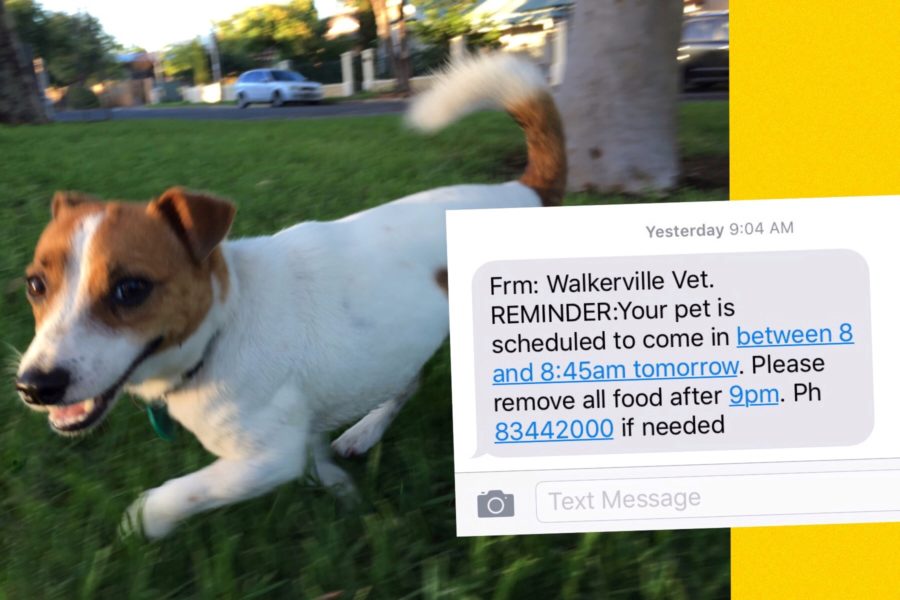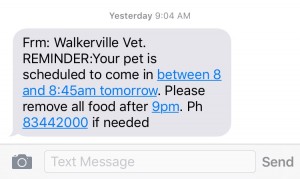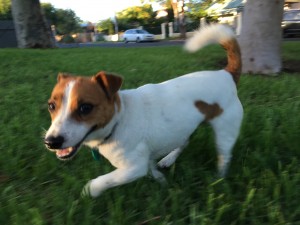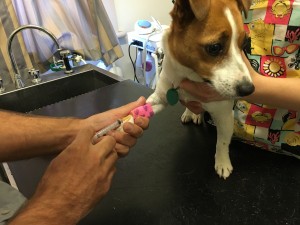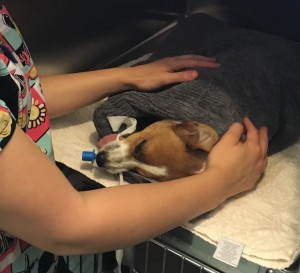Updated November 29, 2020
Does your dog need an operation? Want to know what to do when your cat has surgery? How do you prepare rabbits or rodents for an anaesthetic?
When the time comes, here’s our guide to how to get your dog, cat, rabbit, ferret, rat or mouse ready for surgery. There’s also a guide to what to do for dogs and cats after surgery.
Whatever the procedure, there are several things you must do:
- Schedule The Day Of Surgery
- Prepare The House And Family
- Prepare Your Pet
- Know When To Stop Food And Water
Booking Your Pet’s Surgery
Most vet clinics operate on Monday to Friday. Unlike our consultations with a vet, we won’t always be able to do the surgery on the day you request. The more you book ahead the better chance you’ll get the day you want.
Even when you’ve done everything right, we may see another pet on the same day who needs immediate surgery. This means that on occasions the theatre will be tied up unexpectedly for an emergency procedure and we won’t be able to do your pet’s operation.
This only happens a few times a year, and annoying as it is, most owners understand that we’d do the same for their pet if he or she were the one in need. Your pet’s surgery is important, and we’ll never do it if it can only be done in a rush.
Desexing dogs and cats should be done before six months of age to avoid the first season in females, or unwanted male behaviours. Rabbits and ferrets should be done before four months of age. If your female goes into season, we will advise rescheduling their spey until after the end of the heat period. This avoids us performing an elective procedure at a time of greater risk.
The day before your pet’s surgery you should receive the nifty text message shown earlier. If you don’t, please check we have your up to date contact details.
Do You Need To Take Time Off?
Ask your vet! It’s always nice to be around the next day but for most routine procedures like dentistry or desexing, it’s not really necessary.
Preparing Your Pet
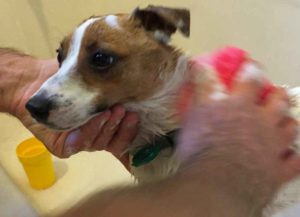
You won’t be able to bath or clip your pet for at least ten days after surgery and it’s not a good idea to apply flea control products. Therefore, it’s a great idea to give them a bath or book them in at the grooming salon before their operation, and then give them their monthly flea control. DO NOT bath your dog on the same day to avoid accidental body temperature loss.
Before coming in, I like a patient to have had some moderate exercise. Not only will it be their last decent outing for a few days, but it helps them toilet before their day in hospital.
Preparing The House & Family
Most pets will need to be well-rested after surgery.
Your vet will tell you how much activity is OK. Some orthopaedic procedures need 100% strict cage rest, others can tolerate some activity. After desexing, for example, pets are OK to walk around the house. For all surgeries you will need to plan how to stop your pet from running and jumping.
Dogs: There are many ways to keep a dog quiet, but the best is to use a crate. We’ve written about using crates for resting and training dogs before.
If your dog isn’t used to being in a crate, a great idea is to purchase one (they are around $100) and train your dog to settle there in advance. It’s best to take it slowly so they don’t get stressed, and then when they come home needing rest, they will tolerate being restricted so much better.
If crating is difficult, you should at least plan to prevent your dog from any access to furniture such as beds and couches by closing doors or overturning chairs. You should also plan to stop any activity with causes excitement, jumping or running. Sometimes you have to disconnect the doorbell!
Cats will need to be kept inside the house, and possibly in just one room if there is still too much activity. You may need to restrict access to benches and other high places.
Rabbits, ferrets and rodents can be easily rested by using their usual nighttime accommodation. Make sure the litter is freshly changed and their enclosure is cleaned for when they come home.
Many people take time off for their pet’s recovery. This is great, but not essential, especially for soft tissue surgery like desexing or lump removal. I made sure I had a day off after Loki’s surgery and it was well worth it.
When To Stop Food & Water
It is essential that your dog, cat or ferret has no food or water in their stomach at the time of their anaesthetic. If they do, under anaesthetic their oesophageal sphincter can relax and allow fluids to pass into the oesophagus, causing acid burns. In some cases these fluids can even reach the lungs, causing severe aspiration pneumonia.
Dogs and cats should have had no food for 12 hours before an anaesthetic, and no water for 8 hours. In our clinic, unless you are otherwise instructed, this means your dog or cat should have their last meal at 9pm the night before, and no water after 1am.
All dogs and cats go on intravenous fluids (the cost is included in desexing) and so you do not need to worry about your pet becoming dehydrated.
You must be utterly ruthless at eliminating all chances of your dog or cat having access to food. All family members need to be instructed to behave themselves! It’s also best all the animals in the house are not fed over the same time to avoid accidents. Water sources such as toilets need to be closed away or covered. Cats must be kept inside to prevent scavenging and food removed even from benchtops.
Food restriction is critical. If there is any chance that your pet may have eaten even one biscuit, please tell us. We will usually reschedule the surgery to avoid any risk.
Water restriction is less important. Please let us know if you haven’t taken the water away, or left it out until morning. We usually can still do the surgery, but we may just do it later in the day.
Ferrets, Rabbits and Rodents should NOT be deprived of food and water. Ferrets have such a rapid gut transit time that the short wait in hospital will be enough. Rabbits and rodents are safe to have food in their stomachs, and in fact it is best if they do.
Please bring in your ferret’s, rabbit’s or rodent’s usual food so they can eat as soon as they are awake.
What To Expect On The Day
Surgery Admission
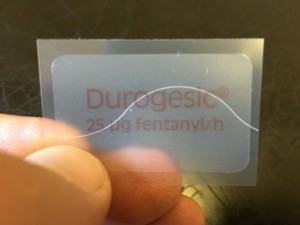
We ask our patients to be admitted between 8am and 8:45am on the morning of surgery. If this is a problem, please ask as it is possible to be flexible. If we haven’t seen your pet before, your pet will receive a free checkup with the vet as well.
The nurse on admission will ask you a series of questions. These include:
- Has your pet been unwell?
- Has there has been any access to food and water?
- Do you have any concerns or other requests such as nail clipping?
- Would you like pre-anaesthetic blood testing? (read why you might choose blood testing here)
Surgery and Anaesthetic
When the theatre and nurses are ready, we’ll start by placing an intravenous drip. Through this we will give a premedicant calming pain relief. Some patients will also have the pain relief patch shown earlier.
Next, we will administer the anaesthetic induction agent (usually propofol).
Once this takes effect, the vet will insert an endotracheal tube and the nurses will connect your pet to a anaesthetic machine delivering inhaled isoflurane gas in oxygen.
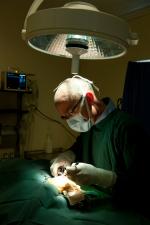
Monitoring equipment and thermal insulation wrapping will be placed, and the surgery site will be clipped of hair.
Then the patient is transferred to the theatre for sterile surgery. See our guide to vet anaesthetics to learn more about how we monitor your pet during their anaesthetic and recovery.
Recovery
Once the surgery is completed, your pet will be transferred to recovery. A nurse will monitor all animals continuously until they are able to sit up and maintain their airway. After this they will usually want to sleep off the rest of the anaesthetic. During this time we will monitor your pet’s pain levels and give extra relief as needed.
Once your pet is awake and ready to go one of our nurses will usually call you. If you have not heard from us by 3pm, please call to arrange a time for discharge from hospital.
Next week I’ll tell you how to look after your pet after surgery.
By Andrew Spanner BVSc(Hons) MVetStud, a vet in Adelaide, Australia. These blogs are from a series regularly posted on email and Twitter. Subscribe via email here to never miss a story!
Have something to add? Comments are welcome below and will appear within 24 hours of lodging.

